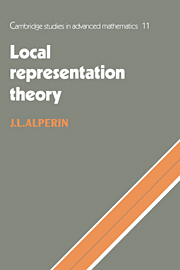 Local Representation Theory
Local Representation Theory I - Semisimple modules
Published online by Cambridge University Press: 12 January 2010
Summary
Simple modules and simple algebras give a great deal of information about arbitrary algebras and their modules and it is this point that we shall develop in this chapter. Semisimple modules are the key idea. They provide a quick proof of the celebrated Wedderburn theorem on simple algebras and they show how any module can be viewed as consisting of many layers of semisimple modules. Our main interest is group algebras and we shall see quickly how these general results lead to insights about group representations.
Let us establish some fixed notation. We let A be a finite-dimensional algebra with unit element over an algebraically closed field k whose characteristic is p. All A-modules are assumed to be left modules and finite-dimensional over k. We also fix a finite group G and let kG be the group algebra of G over k. When we refer to p-groups or p-subgroups of G we shall be implicitly assuming that p is a prime.
Simple modules
There is a close connection between the structure of A and the structure of A-modules. Certainly the most important A-module is A itself with the module structure given by left multiplication. Moreover, if U is any A-module and u1, …, un are generators for U (for example, a basis of U over k) then U is a homomorphic image of the A-module A ⊕ … ⊕ A, the direct sum of n copies of A, via the map which sends the n-tuple (a1 …, an) to a1u1 + … + anun, as is easily verified.
Information
- Type
- Chapter
- Information
- Local Representation TheoryModular Representations as an Introduction to the Local Representation Theory of Finite Groups, pp. 1 - 20Publisher: Cambridge University PressPrint publication year: 1986